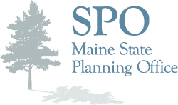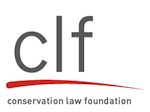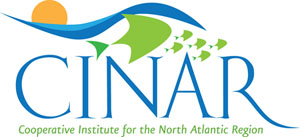Analysis
by Pam DiBona
“Those who can’t—teach.” This quote from H.L. Mencken still stings science educators, in part because the ability to teach science is an art unto itself, and not an easy task.
One of the New England Ocean Science Education Collaborative’s (NEOSEC’s) operating principles is that scientists and educators both have something to learn from each other, and in fact the practice and research required for both education and science are important to developing robust programs in both disciplines.
NEOSEC was formed in 2005, and has grown to include more than 40 institutions around the region, including universities, informal science education centers and aquariums, research institutions, and government entities. The organization’s mission is to leverage New England’s extraordinary assets to engage the public in understanding the vital connections between people and the ocean.
Through several federally funded programs, NEOSEC has connected scientists and educators to produce new means for advancing ocean literacy in the region.
One, under a subcontract to the Center for Ocean Sciences Education Excellence Ocean Systems (COSEE OS), funds scientist-educator partnerships to demonstrate the “broader impact” of the scientists’ research.
The second program described here centers on citizen science carried out by teen summer campers, who have been collecting data alongside practicing ocean scientists.
Mini-grants for broader impact
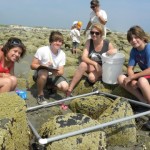 |
|
As part of their summer camp program at BOAT CAMP Nature School, teens took part intertidal monitoring along the rocky shore in Newburyport (Mass.) alongside biologist Sara Ellis. Photo Credit: Sara Ellis |
Funded by the National Science Foundation (NSF) COSEE OS, based at the University of Maine’s Darling Marine Center, is exploring the best means for helping NSF scientists meet NSF’s requirement to demonstrate “broader impact” of federally-funded research. A partner in the NSF grant, NEOSEC is administering a mini-grant program for Collaborative members. The funded projects described below will help ocean scientists achieve broader impacts with their research, and build regional capacity for scientist-educator partnerships.
Silent Spring Revisited: Rachel Carson’s Legacy and Ocean Health Today
The Marine Environmental Research Institute (MERI) and Cornerstones of Science (CoS) will bring a rich, multidisciplinary, place-based program to audiences throughout Maine in recognition of the 50th anniversary of Rachel Carson’s seminal work, Silent Spring. The program will connect ocean scientists, informal educators and audiences; increase understanding of the critical link between science, science literacy, and public policy; and develop a new collaborative model between local community libraries and centers for ocean science research.
MERI will host a lecture series to discuss the impact of Rachel Carson’s book and current issues facing the Gulf of Maine and beyond. In Fall 2012, the Portland Public Library will host a Rachel Carson Legacy Event that includes a multidisciplinary panel discussion.
A “Resource Guide on Rachel Carson” to be developed by CoS will also be made available local libraries and the larger network of ocean educators.
Right Whales and Ocean Observing: An Exhibit that Connects People to Research
Purpose
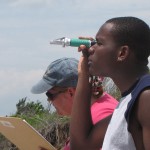
|
|
Summer campers at Waquoit Bay (Mass.) National Estuarine Research Reserve learned everything from identifying macroalgae to working with a salinometer, thanks to ocean science researcher Liz Bonk. Photo Credit: WBNERR |
The principal goal of this project is to inform the public about the effects of shipping on the endangered North Atlantic Right Whale population based on research by Stellwagen Bank National Marine Sanctuary (SBNMS) scientists. A prototype exhibit—featuring acoustic studies and real-time data—will be created by the Northeastern Regional Association of Coastal Ocean Observing Systems with support from the Seacoast Science Center (SSC) and SBNMS.
The exhibit’s main message will be the impacts of ship noise and strikes on Right Whales, and how SBNMS research is helping to better understand and reduce threats.
The project will incorporate an interactive touch-screen panel into the SSC’s permanent exhibit Tofu: The Journey of a Humpback Whale. This panel will include COSEE-OS concept maps based on Gulf of Maine Right Whale research. The project will also develop a visitor program highlighting the exhibit’s message points for dissemination to SSC visitors (over 75,000 annually).
Paths to Dissertation: Encountering Graduate Student Experiences and Research
A Northeastern University Marine Science Center (NUMSC) pilot study will be conducted to: i) Improve ability of graduate students and outreach/communications staff (OCS) to connect with various audiences; ii) Increase awareness of prospective university students and the public about marine science and its study; and iii) Facilitate collaboration between OCS and ocean scientists.
Through a series of meetings, graduate students will employ concept mapping to practice and improve their communication skills. They will produce interactive maps about their research and personal experiences in graduate school. Each participant will also design at least one classroom activity that can be used in NUMSC outreach efforts. A culminating “concept map poster session” and program overview event will be held for participants, faculty advisors and peers.
At least one graduate student will also be supported to share her/his results with the wider marine education and/or university community. Lastly, NUMSC outreach staff will develop an overarching concept map about the program’s rocky shore curriculum and its ties to current research projects.
Summer Science in New England
For teens up and down the New England coastline, a summer spent scrambling over rocks is great fun. Throw in a transect line and quadrats, and a little guidance from trained educators and scientists, and it becomes great science as well.
NEOSEC’s Summer Science program, funded by the National Oceanic and Atmospheric Administration (NOAA), now in its third year, engages youth in 12 summer camps from Mystic, Connecticut to Beals Island, Maine in a citizen science program that contributes data to the international Global Ocean Biogeographic Information System, established by the Census of Marine Life.
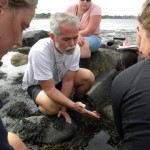
|
|
Suffolk University Biologist Tom Trott trained camp staff educators and partner scientists in the finer points of species identification at a two-day training session hosted by the Seacoast Science Center in Rye NH. Photo Credit: Sara Ellis |
The summer season begins with a two-day training session for both educators and partner scientists (one per camp), including training by Tom Trott, a Census scientist and biology professor at Suffolk University, in the NaGISA protocol. Employing this simple, cost-efficient and intentionally low-tech sampling protocol, scientists around the world are inventorying and monitoring biodiversity in the narrow inshore zone of the world’s oceans (the Japanese word nagisa refers to the narrow coastal zone where land meets the sea). All trainees also learn best practices for working with young people in the field, and the ins and outs of engaging them in learning scientific names and random number generation.
Almost 400 teens (113 in 2010 and 272 in 2011) now know how to do everything from determining water salinity to distinguishing between Pagurus longicarpus (Long-armed Hermit Crab) and Pagurus acadianus (Acadian Hermit Crab). The culminating event for the teens—and the scientists—is a Teen Ocean Summit. All of the researchers, both the young and the more experienced, dive into the data collected over the summer, asking questions and making predictions about co-occurrence of particular species, trends relative to surface water temperature, and latitudinal variability in biodiversity. Teens report greater understanding of how science is carried out, and what marine scientists do; participating scientists express their intention to continue contributing to informal science education.
Future Efforts
NEOSEC has identified scientist-educator partnerships as a topic for regional professional development, communications, and future funding proposals. This fall, NEOSEC’s fourth biennial Ocean Literacy Summit will highlight these efforts—and perhaps foster new ones—with a focus on Ocean Literacy Principle 7: The ocean is largely unexplored. Scientist-educator teams will present their joint work, share means for incorporating new research into education settings, and demonstrate effective exchange of expertise in education and science. After all, we all have something to teach one another.
Contact: Pam DiBona, NEOSEC Coordinator (pdibona@neaq.org)
Website: http://www.neosec.org/
Print




